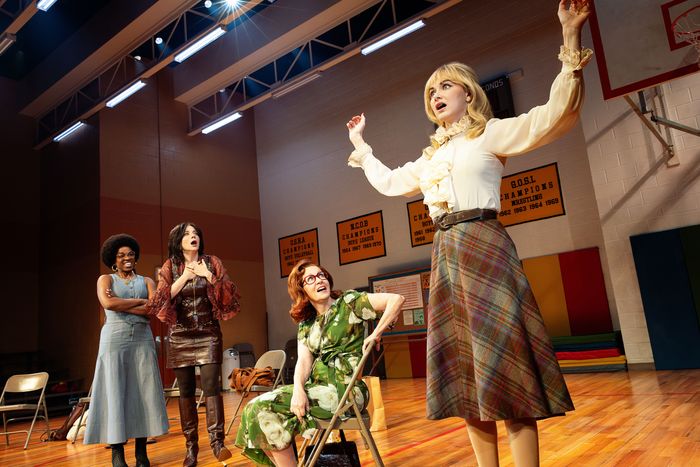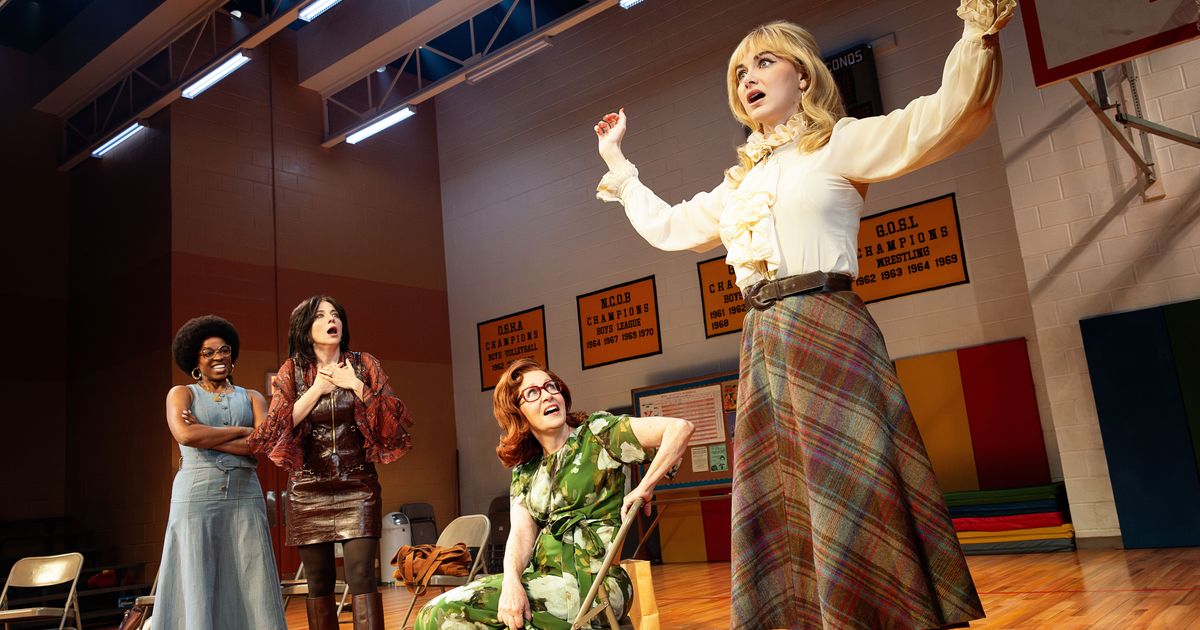
Frome Liberation, at the James Earl Jones Theatre.
Photo: Little Fang
What happens when a group of people gather in a room and really listen to each other? That may sound like an ordinary enough act, and as you walk into the James Earl Jones Theater, you might find yourself deceived by David Zinn’s 1970s basic gym basement of a set, or by Susannah Flood’s hand-holding introductory address to the audience—fear not a long running time, she says, standing in for the playwright Bess Wohl, all those six-hour plays are by men who didn’t have children. Don’t be scared, Flood may well be saying, we’re just here at Liberation to watch a group of women sit and talk. You’ll get your phones back soon. But talk, as simple as it sounds, can be transformative, which is the point of the consciousness-raising group Wohl’s work revives onstage, and a quality that Liberation bears out in performance. Both times I’ve seen the play—Off Broadway this spring, now returning in a larger space on Broadway—I’ve felt unprepared for the emotional wallop it lands, the way that Wohl’s work becomes cosmically immense without leaving that gym basement. I think it gets there by staying so focused on the quietly radical thing these women are doing with each other, and which Wohl is making the rest of the audience engage in. Maybe you shouldnt be scared, because listening could change you too.
Liberation takes so many forms it can become difficult to keep track of the genre it occupies at any moment, a quality that makes the play thrilling to watch, if also difficult to categorize. It presents first as veiled autobiography—Wohl’s script is subtitled “a memory play about things I don’t remember”—as Flood takes on the character of a playwright who’s attempting to understand the feminist thing that her mother and her friends in suburban Ohio “tried very hard to do.” In one of Wohl’s many great little addenda, she pauses, “No, A thing that they did, that they unquestionably did.” Through the format of a memory play, Flood’s character steps backward into the role of her own mother, and then invites the figures of other women involved in her group onstage. There’s docu-theater reporting at work (a format Wohl explored with The Civilians), as Wohl’s own mother was indeed a writer for Ms.and she interviewed women involved in such a group for the play. But she and her director Whitney White pierce back and forth through the scrim of realism freely—in a sudden yet always legible instant, a scene will transition from a conversation between the members of the group over to Flood, once again playing the daughter, as she interviews one of those women decades later, trying to understand how it all could have felt. The first time we see that move, Flood is talking to the fierce Italian Isidora (Irene Sofia Lucio, often erupting like she’s Mount Etna). In the ’70s, she’s stuck in Ohio in a green-card marriage; looking back, she insists the movement failed because they played it safe. “Middle-of-the-road is the death of everything,” she announces. She recommends that her interviewer go see some David Mamet. Has she heard of Oleanna?
Of the women in the group, Isidora, with her forceful, often incoherent radicalism, grabs your attention first, although the others soon get time in the sun. She and Flood’s Lizzie—a journalist who’s put in the work of printing flyers and researching activities, but is gun-shy about committing to more confrontational action—are joined by Betsy Aidem’s disaffected homemaker Margie; Audrey Corsa’s prime career girl (she initially thought this was a knitting group) Hand; Adina Verson’s “womanifesto”-writing Susan, who lives out of her car; and Kristolyn Lloyd’s tense, Radcliffe-educated intellectual Celeste, who is the only Black woman in the group. Their scatter plot of opinions makes it easy for Wohl to dramatize the era’s (often, still echoing now) debates about bodily autonomy, the value of marriage, sex in the workplace, and more. Celeste and Isidora, coastal émigrées to Ohio, may see themselves as truer stewards of the movement than the Midwesterners around them, but they disagree about sex work. That might come across as schematic, but Wohl’s interest in character specifics and the rich work of Liberation‘s ensemble deepen the currents—watching the play the second time around, you can track the gathering force of unspoken dynamics that burst forth later on, and appreciate the way Wohl threads in glimpses of the women’s lives outside the group, like Margie’s relationship with her husband or Dora’s career. The work is often uphill (pretty much always, with Margie’s husband), but these conversations are changing these women, even if they despair about how ineffective and self-defeating their internal debates may seem. At the top of the second act, the women re-create an exercise from Ms. and disrobe together onstage while discussing what they do and don’t like about their bodies. The nudity is, inevitably, the play’s big event, and you’re aware it’s coming from the moment you arrive, when an usher asks you to put your phone in a Yondr pouch. But it’s to Wohl and White’s credit that the scene whirs along, with both great attention to how striking it is to see unsexualized naked bodies onstage and an eye for the way the conversation circles back around to ordinary hangups, how much this scene resembles so many of the play’s other ever-shifting group dialogues. Transformation doesn’t strike like a lightning bolt, but it does come. You’ll notice that once the cast members return to their clothes, the designer Qween Jean costumes them in outfits that all involve blue jeans fabric, forging an unspoken unity through denim.
That image and others like it give Liberation a warm heartbeat, even if Wohl sets it against an atmosphere of despair. Deep into a Trump presidency—Flood’s line in her introductory speech, “why does it feel somehow like it’s all slipping away?” hits all the harder a year and a half after the premiere, owing to whatever push notification was on your phone when you locked it up. During the 1970s portions, Wohl allows in an ominous awareness of the rise of the Moral Majority and of Ronald Reagan off in the distance (Isidora’s, unsurprisingly, a fan). But she focuses more on the fractures of the left. From the beginning, there’s comedy to be mined from Lizzie’s anxious attempts to both lead the group and instill an egalitarian, no-interruptions environment; she’s constantly stepping on toes while insisting she’s trying not to. And there are deeper divides that the act of listening might not be enough to cross. As the Black woman among the group, Celeste is continually the odd woman out, anxious about tokenization—”Like, what is my presence doing here, in this story?” she asks Lizzie, in a line that seems to come from both the character and the actor, “I struggle with that, I do.” Later on, Celeste has a rich argument with Kayla Davion’s Joanne, another Black woman, who is a homemaker and emphatically not a member of the group; she just keeps walking into the gym to retrieve a backpack one of her sons has forgotten. The scene both lets Wohl expand Liberation to include another dimension of feminist debate, and self-awarely, if somewhat cutely, to acknowledge her limits—”stick to what you know,” Celeste tells Flood’s playwright when she intrudes.
That’s advice that Wohl herself doesn’t necessarily follow. That gap between what you know of someone and what you can truly understand of them is the scab that Liberation keeps picking at. The play is constantly running a nail over divisions that seem untraversable, across politics, class, and race, but also across generation and gender, wondering if solidarity could possibly still form there. Flood’s playwright is haunted by the fact that her mother, like many in the movement, did eventually meet a man, settle down, and compromise on utopian ambitions to raise her kids. The moment when Charlie Thurston, with a compelling mustache, enters the gym at the end of the first act playing that man—her dad and Lizzie’s husband—is one of Liberation‘s most reliable punchlines. He casually dribbles a basketball and you think, oh shit Lizzie doesn’t stand a chance. And although that playwright rails against the idea that a guy could be so important to this play about feminism, his and Lizzie’s romance triggers a stunning series of turns from Liberation‘s second act, in which Wohl puts the theater to work doing what only it can do. In one scene, Davion steps into the center of the narrative, literally putting on Lizzie’s shoes, literally, Flood’s character can’t stand to act out a romance with her own father. It’s a daring idea, in a play so much about bodies, to allow one to suddenly stand in for another and to make the audience reckon with how they respond to the change. The tactic repeats in a different form later, when Aidem offers to channel the playwright’s mother for her, to let her ask the questions she hasn’t been able to. The scene that follows is predicated on the simplest of dramatic gestures—it’s just an actor taking on another part—but in action it’s shattering. It releases this incredible kinetic energy. For a few minutes of theater, some great barrier has fallen, and everything is possible and free.
Liberation is at the James Earl Jones Theatre.

اترك تعليقاً